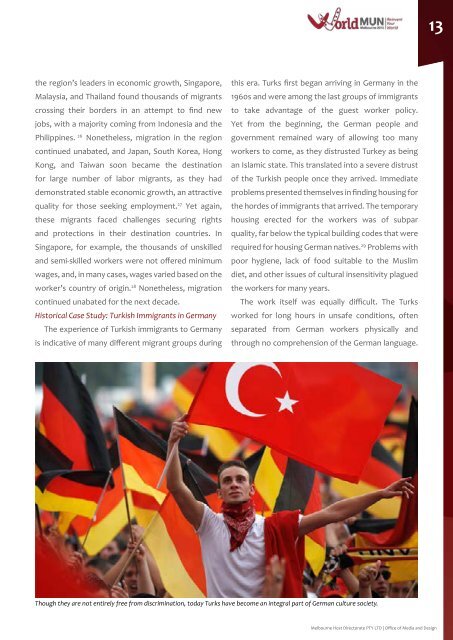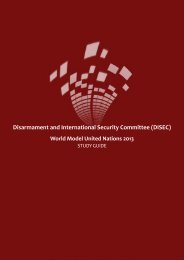SPECPOL - World Model United Nations
SPECPOL - World Model United Nations
SPECPOL - World Model United Nations
Create successful ePaper yourself
Turn your PDF publications into a flip-book with our unique Google optimized e-Paper software.
the region’s leaders in economic growth, Singapore,<br />
Malaysia, and thailand found thousands of migrants<br />
crossing their borders in an attempt to find new<br />
jobs, with a majority coming from Indonesia and the<br />
Philippines. 26 Nonetheless, migration in the region<br />
continued unabated, and Japan, South Korea, Hong<br />
Kong, and Taiwan soon became the destination<br />
for large number of labor migrants, as they had<br />
demonstrated stable economic growth, an attractive<br />
quality for those seeking employment. 27 yet again,<br />
these migrants faced challenges securing rights<br />
and protections in their destination countries. in<br />
Singapore, for example, the thousands of unskilled<br />
and semi-skilled workers were not offered minimum<br />
wages, and, in many cases, wages varied based on the<br />
worker’s country of origin. 28 Nonetheless, migration<br />
continued unabated for the next decade.<br />
Historical Case Study: Turkish Immigrants in Germany<br />
The experience of Turkish immigrants to Germany<br />
is indicative of many different migrant groups during<br />
this era. Turks first began arriving in Germany in the<br />
1960s and were among the last groups of immigrants<br />
to take advantage of the guest worker policy.<br />
Yet from the beginning, the German people and<br />
government remained wary of allowing too many<br />
workers to come, as they distrusted Turkey as being<br />
an Islamic state. This translated into a severe distrust<br />
of the Turkish people once they arrived. Immediate<br />
problems presented themselves in finding housing for<br />
the hordes of immigrants that arrived. The temporary<br />
housing erected for the workers was of subpar<br />
quality, far below the typical building codes that were<br />
required for housing German natives. 29 Problems with<br />
poor hygiene, lack of food suitable to the Muslim<br />
diet, and other issues of cultural insensitivity plagued<br />
the workers for many years.<br />
The work itself was equally difficult. The Turks<br />
worked for long hours in unsafe conditions, often<br />
separated from German workers physically and<br />
through no comprehension of the German language.<br />
Though they are not entirely free from discrimination, today Turks have become an integral part of German culture society.<br />
13<br />
Melbourne Host Directorate PTY LTD | Office of Media and Design

















